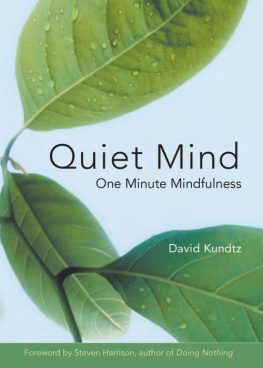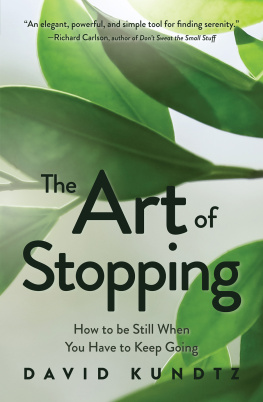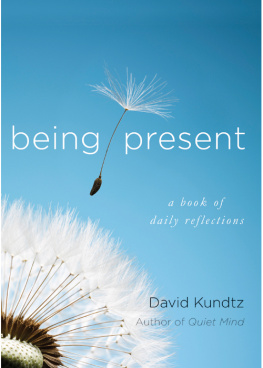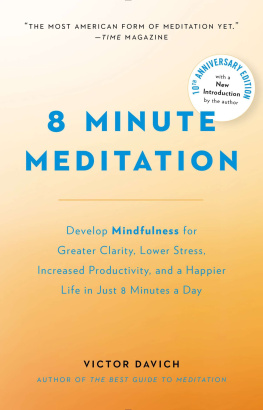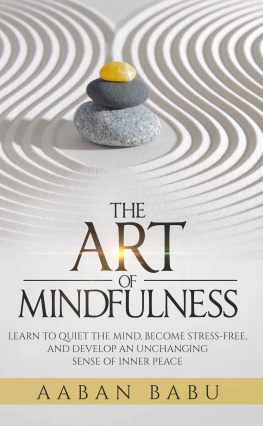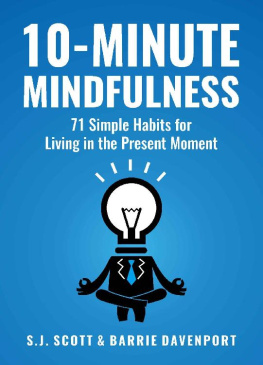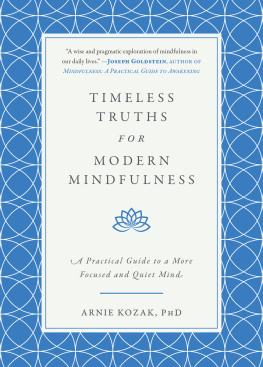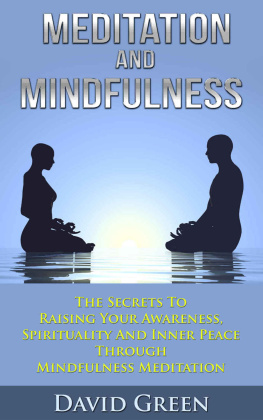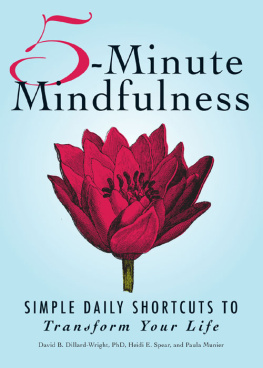David Kundtz - Quiet Mind: One Minute Mindfulness
Here you can read online David Kundtz - Quiet Mind: One Minute Mindfulness full text of the book (entire story) in english for free. Download pdf and epub, get meaning, cover and reviews about this ebook. year: 2002, publisher: Conari Press, genre: Home and family. Description of the work, (preface) as well as reviews are available. Best literature library LitArk.com created for fans of good reading and offers a wide selection of genres:
Romance novel
Science fiction
Adventure
Detective
Science
History
Home and family
Prose
Art
Politics
Computer
Non-fiction
Religion
Business
Children
Humor
Choose a favorite category and find really read worthwhile books. Enjoy immersion in the world of imagination, feel the emotions of the characters or learn something new for yourself, make an fascinating discovery.
- Book:Quiet Mind: One Minute Mindfulness
- Author:
- Publisher:Conari Press
- Genre:
- Year:2002
- Rating:4 / 5
- Favourites:Add to favourites
- Your mark:
- 80
- 1
- 2
- 3
- 4
- 5
Quiet Mind: One Minute Mindfulness: summary, description and annotation
We offer to read an annotation, description, summary or preface (depends on what the author of the book "Quiet Mind: One Minute Mindfulness" wrote himself). If you haven't found the necessary information about the book — write in the comments, we will try to find it.
Quiet Mind: One Minute Mindfulness — read online for free the complete book (whole text) full work
Below is the text of the book, divided by pages. System saving the place of the last page read, allows you to conveniently read the book "Quiet Mind: One Minute Mindfulness" online for free, without having to search again every time where you left off. Put a bookmark, and you can go to the page where you finished reading at any time.
Font size:
Interval:
Bookmark:



Copyright 2000 by David Kundtz
All Rights Reserved. No part of this book may be used or reproduced in any manner whatsoever without written permission, except in the case of brief quotations in critical articles or reviews. For information, contact: Conari Press, an imprint of Red Wheel/Weiser, llc, P.O. Box 612, York Beach, ME 03910-0612.
The lines from Guardian Angel are reprinted from Twenty Poems of Rolf Jacobson, translated by Robert Bly, Seventies Press, Madison, MN, 1976. Copyright 1976 by Robert Bly. Reprinted with his permission.
Kabir's poem, Breath, is reprinted from The Kabir Book, Versions by Robert Bly, Beacon Press, Boston, 1977. Copyright 1977 by Robert Bly. Reprinted with his permission.
Cover and book design by Maxine Ressler
Cover photo Jun Kishimoto/Photonica
ISBN: 1-57324-862-2
Originally published in 2000 by Conari Press as Everyday Serenity under ISBN: 1-57324-162-8.
Printed in Canada.
02 03 04 05 tc 10 9 8 7 6 5 4 3 2 1
www.redwheelweiser.com
www.redwheelweiser.com/newsletter
I dedicate this book of reflections to all the clients, past and present, of my counseling practice in gratitude for your trust.
Your stories are for me, without exception, pure grace.
It is because artists do not practice, patrons do not patronize, crowds do not assemble to reverently worship the great work of Doing Nothing, that the world has lost its philosophy....
G. K. Chesterton
by Steven Harrison
Author of Doing Nothing
We have collectively built an amazing world of technological wonder, of scientific marvels, and unparalleled productivity. But in this best of all possible worlds, we have learned so much about how to do that we have forgotten how to be.
We want to know what to do about this. We want to fix our lives. We want to build better lives. We want to do more. But, of course, doing can never bring us to being.
There is nothing to do.
In this realization something magical unfolds: Being is what remains when we stop trying so hard. In the stopping we discover the vast spaciousness of life, of love, of connection.
In Quiet Mind, David Kundtz leads us to those quiet moments of stopping and stillness in which we can just be. Thus he shows us that it is life that we are grappling with, not an abstraction, not a spiritual system to be learned and practiced, but the vital, everchanging, often overwhelming, but always present life that each of us lives, every day, with no vacations.
Life is the unavoidable context with which we have been gifted, and that bestows on us the greatest of all opportunities, the discovery of the ground of being in each moment.
Welcome to a new way to cope with the demands of a too-busy life.
Welcome to a way that requires no difficult skills, adds no new burdens, and accommodates all spiritual systems and life-styles.
Welcome to all who want to do nothingmore often, more creatively, with joy, and without guilt.
Welcome to one-minute retreats that can be yours at any time of the day or night.
Welcome to a quiet mindtranquility, calmness, and clarityin the midst of a too-busy world.
Whatever project you undertake, whether personal or business, spiritual or physical, noble or mundane, if you do not begin it from a mindful posturefrom the quiet state of your beingyou are headed for disappointment and failure. It's the nature of things. It's the only successful way to begin anything.
These reflections are based on, and are examples of, the practice of Stopping, which is doing nothingfor as briefly as a minute or for as long as a monthfor the purpose of becoming more fully awake and remembering who you are.
You'll read about Stillpoints, the frequent, momentary pauses in your day. You'll also find examples of Stopovers and Grinding Halts, which are simply longer times of doing nothing but with the same purposebecoming more awake and intentional, recalling what you want and need, where you've come from, where you're going, and how you'll get there.
Here you will find brief invitations to take time for yourself, to rest, to find peace, to awaken, to remember, and to find ways to recognize what you may have forgotten, and how not to forget again.
Each of the reflections can serve as a Stillpointa pause for a purposeto draw you to a moment of both rest and insight. You will also find meditations on longer times of rest and peace, and encouragement to fit them into your schedule.
These reflections are invitations to do nothing, and to do it with purpose, with meaning, and with value.
These reflections want to lead you to transform wasted time into the most important times of your life: times of stillness, solitude, peace, and equanimity.
Welcome to a quiet mind.
David Kundtz
Kensington, California
one
Still Moments in Busy Days
Nobody sees a flower, reallyit's so smallwe haven't time, and to see takes time....
Georgia O'Keeffe
These are the days of the time famine, says Odette Pollar in her newspaper column aimed at helping people work smarter. She cites some interesting statistics. According to a Harris survey, the amount of leisure time enjoyed by the average American has shrunk 37 percent since 1973. In the same period, the average work week, including commute time, has jumped from fewer than 41 hours to nearly 47 hours, and in some cases up to 80 hours a week.
I like the term time famine, and starvation is certainly an appropriate analogy for our situation. Many of us are starved for time and we have a passionate desire to be fed. We are starving for those moments of solitude when we can just hang out, cleaning out a drawer or looking through old letters, with no pressure or guilt. Our starvation deprives us of the nutrition that those in-between times used to give us: a feeling of centeredness in our lives, of awareness of our spiritual needs and those of our families, a confident sense of self-knowledge.
Georgia O'Keeffe's words ring authentic as you look at her paintings of flowers She spent many hours doing nothing with a flower. No time famine for her. Her artistic life in the desert was a statement against that idea. And we continue to benefit from the results.
In a famineat least in the best of situationsthose who have help those who have not. Thus a question presents itself: Where are you in the time famine, among the haves or the have-nots? Sometimes one, sometimes the other?
For have-nots: Today, stop and really look at a flower (or an O'Keeffe rendering of one).
For haves: Help someone else to do the same.
The trouble with the rat race is even if you win, you're still a rat.
Lily Tomlin
The metaphor of the rat race as a way to talk about the nature of contemporary life is instructive. I wonder about its origin. And just what is a rat race? I picture a maze in some scientific laboratory with a dozen rodents scrambling in all directions, trying with great frustration to find their way to freedom. Is that a rat race? Did anyone tell the rats they were in a race? Is there really a winner in a rat race?
Font size:
Interval:
Bookmark:
Similar books «Quiet Mind: One Minute Mindfulness»
Look at similar books to Quiet Mind: One Minute Mindfulness. We have selected literature similar in name and meaning in the hope of providing readers with more options to find new, interesting, not yet read works.
Discussion, reviews of the book Quiet Mind: One Minute Mindfulness and just readers' own opinions. Leave your comments, write what you think about the work, its meaning or the main characters. Specify what exactly you liked and what you didn't like, and why you think so.

